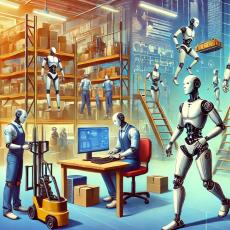
Quantum computers have long been touted as the future of computing, promising to revolutionize industries and solve problems that are intractable for classical computers. But how exactly do quantum computers achieve this, and what kinds of problems are they uniquely suited to solve? Let’s delve into the fascinating world of quantum computing and explore its groundbreaking potential.
What Makes Quantum Computers Different?
At the heart of quantum computers lies the principles of quantum mechanics. Unlike classical computers, which process information as binary bits (0s and 1s), quantum computers use qubits. A qubit can represent 0, 1, or both simultaneously, thanks to a property called superposition. This allows quantum computers to explore multiple solutions to a problem at once.
Another key property is entanglement, where qubits become interconnected so that the state of one qubit is directly related to the state of another, regardless of the distance between them. This enables highly efficient parallel processing and problem-solving capabilities far beyond what classical computers can achieve.

Problems Quantum Computers Excel At Solving
Quantum computers are not simply faster versions of classical computers; they are designed to tackle entirely different categories of problems. Here are some of the most promising applications:
1. Optimization Problems
Optimization problems arise in fields like logistics, finance, and manufacturing, where the goal is to find the best solution from an enormous number of possibilities. For example:
Airline scheduling: Determining the optimal routes and schedules for thousands of flights.

Portfolio management: Identifying the best investment strategy considering a vast array of variables.
Classical computers struggle with these problems as the number of possible solutions grows exponentially. Quantum computers, leveraging superposition and entanglement, can evaluate multiple solutions simultaneously, drastically reducing computation time.
2. Cryptography
Current encryption systems, such as RSA, rely on the difficulty of factoring large numbers—a task classical computers handle poorly. Quantum computers, using Shor’s algorithm, can factorize these numbers exponentially faster, potentially breaking many existing encryption methods. This has profound implications for cybersecurity, necessitating the development of quantum-safe cryptography.

3. Drug Discovery and Material Science
Simulating molecular interactions is computationally intensive and often beyond the reach of classical computers. Quantum computers excel in this area because they operate on the same quantum principles as molecules themselves. Applications include:
Designing new drugs by simulating how molecules interact.
Creating advanced materials with specific properties, such as superconductors or lightweight alloys.
4. Artificial Intelligence and Machine Learning
Quantum computers can accelerate machine learning algorithms by efficiently exploring large datasets and optimizing neural networks. For example, they could:
Improve natural language processing for more accurate AI chatbots.
Enhance image recognition systems for medical diagnostics or autonomous vehicles.
5. Complex Simulations
From climate modeling to astrophysics, many simulations require enormous computational resources to model real-world systems accurately. Quantum computers can simulate complex quantum systems directly, making them invaluable for predicting weather patterns with unprecedented accuracy, or simulating black holes or other phenomena in astrophysics.

Why Classical Computers Can't Compete
Classical computers operate sequentially and rely on approximations to tackle large-scale problems. While they are excellent for everyday tasks, they fall short when the problem space grows exponentially (e.g., factoring large numbers or optimizing a global supply chain), or when high precision is required for simulating quantum systems.
Quantum computers, by contrast, can explore these vast problem spaces in parallel, providing exact solutions to problems that classical computers can only approximate or fail to solve entirely.
Challenges in Quantum Computing
While the potential of quantum computing is immense, several challenges remain:
Error Rates: Qubits are highly sensitive to environmental noise, leading to errors in computation.
Scalability: Building large-scale quantum computers with thousands or millions of qubits is a significant engineering challenge.
Cost: Quantum computers are currently expensive to build and maintain, limiting accessibility.
Current Progress and Future Outlook
Despite these challenges, progress in quantum computing has been rapid:
Companies like IBM, Google, and Microsoft are developing quantum computers with increasing numbers of qubits.
Google’s quantum processor, Sycamore, achieved quantum supremacy by solving a problem in 200 seconds that would take the world’s fastest supercomputer 10,000 years. More recently, Google introduced Willow, a next-generation quantum processor designed to push the boundaries even further, highlighting the rapid progress being made in this field.

Google’s Willow quantum processor Startups and research institutions are exploring innovative quantum algorithms to unlock new applications.
In the coming decades, as quantum hardware improves and error-correction techniques evolve, we can expect quantum computers to transition from experimental devices to practical tools that transform industries.
Conclusion
Quantum computers represent a paradigm shift in computing. By harnessing the unique properties of quantum mechanics, they can solve problems that classical computers cannot, opening new frontiers in science, technology, and industry. While challenges remain, the potential benefits—from revolutionizing cryptography to accelerating drug discovery—make quantum computing one of the most exciting and transformative technologies of our time.
As we stand on the brink of the quantum era, one thing is clear: the problems we thought were impossible to solve may soon have answers, thanks to the power of quantum computing.




